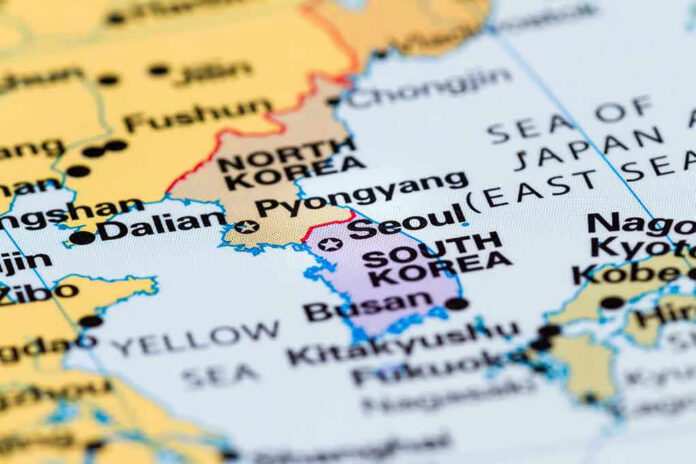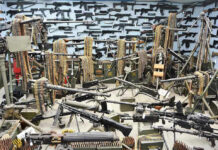A North Korean man risked death by landmine and gunfire to cross the DMZ into South Korea—while Seoul’s leadership seems more focused on appeasing Pyongyang than defending its own border.
At a Glance
- The DMZ is one of the world’s most dangerous and heavily fortified borders, yet a North Korean man crossed it on foot and survived.
- South Korea’s new administration has been easing up on its border policies, halting loudspeaker broadcasts and cracking down on activists instead of North Korean provocateurs.
- The North Korean crosser was unarmed, raising questions about his motives and South Korea’s response strategy.
- Critics argue that the current policy of engagement and restraint could embolden further North Korean provocations and undermine deterrence.
Man Walks Through the World’s Most Dangerous Border—And Seoul’s Leaders Barely Bat an Eye
What does it say about South Korea’s priorities when a North Korean man can skedaddle through the DMZ—dodging landmines and thousands of armed soldiers—without a shot fired? The Demilitarized Zone isn’t just a fence; it’s a 2.5-mile-wide, 150-mile-long no-man’s land that’s been on hair-trigger alert since 1953. Yet, despite this high-voltage security, one man managed to cross from the North and stroll into the South. He was unarmed and alone, but that didn’t stop the South Korean Joint Chiefs of Staff from scrambling to take him into custody. As the dust settled, the American-led United Nations Command was notified, and the incident was handled without escalation. No unusual movement from the North Koreans. No military standoff. Just a single man, a crossing, and a whole lot of questions left in his wake.
President Lee Jae Myung’s administration has recently bent over backward to “ease tensions” with Pyongyang. The government halted anti-Kim loudspeaker broadcasts and has even banned activists from launching balloons northward—balloons that carry nothing more than leaflets and USB sticks. Meanwhile, North Korea has been busy sending thousands of literal garbage balloons into the South and has had troops tiptoeing over the military demarcation line more than once in the past year. Apparently, that doesn’t merit a stern response. Instead, the new policy seems to be: “If you can’t beat them, just hope they play nice.”
A Soft Approach Meets a Hardened Foe
The DMZ isn’t just a border; it’s the last frontier of the Cold War. It separates freedom on one side from a totalitarian nightmare on the other. Historically, anyone caught trying to cross it risked a bullet, a landmine, or a one-way ticket to a North Korean prison camp. Most defectors flee through China, not the DMZ, because the odds of surviving the border are slim to none. That’s why this incident is so unusual—it’s a flashing neon sign screaming that the current administration’s policy isn’t working. The North Korean regime, led by Kim Jong Un, views any defection as high treason. So, when a man from the North makes it across, it’s not just an embarrassment for Pyongyang; it’s a test for Seoul. South Korea is supposed to balance deterrence with engagement, but right now, it looks like the scales are tipping dangerously toward appeasement. Critics are already blasting President Lee’s approach, warning that it sends the wrong message to both friends and foes. Easing up on deterrence only emboldens Pyongyang, which has a long track record of taking a mile when given an inch.
South Korea’s military and political leadership are under the microscope. Domestic critics and international partners alike are questioning whether this soft-pedal strategy is putting the country—and its people—at greater risk. The U.S., for its part, is watching closely, given its decades-old alliance and the thousands of American troops stationed on the peninsula. The last thing anyone needs is for North Korea to see this as a green light for more incursions, more trash balloons, or worse.
The Human Cost—and the Political Fallout
The man who crossed into South Korea is currently in custody, his motives still a mystery. Was he desperate for freedom? Was he a spy? Or just sick of the Kim family cult? Whatever the reason, his fate is now tangled in a web of politics, security, and humanitarian concerns. South Korean officials haven’t confirmed if he’ll be treated as a defector, but the question is almost beside the point. The bigger issue is what his crossing says about the state of the border—and the state of South Korean resolve.
This incident is already fueling a heated political debate ahead of upcoming elections. Should South Korea double down on deterrence, or keep betting that “engagement” will somehow change the calculus in Pyongyang? Human rights advocates point to the desperation that drives North Koreans to risk everything for a shot at freedom. Defense experts warn that every act of leniency could be interpreted by Kim Jong Un as weakness, not wisdom. In the meantime, the DMZ remains a powder keg, and Seoul’s leadership seems determined to pretend it’s just another day at the office. The longer this charade continues, the more likely it is that the next border breach won’t end so quietly.











